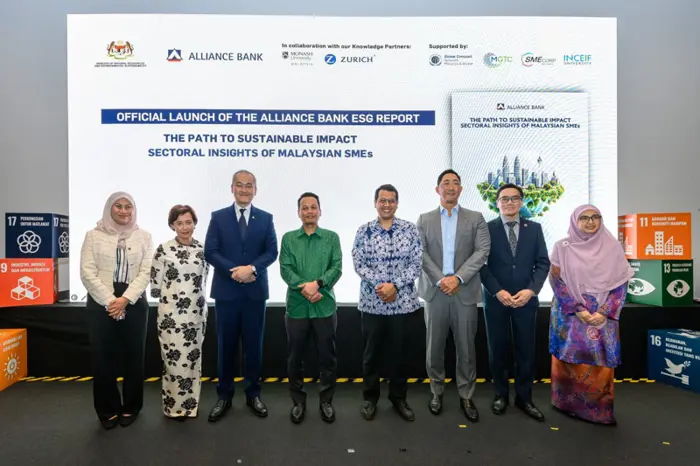
SMALL and medium sized enterprises have even more reasons to embrace ESG within their business framework in order to remain competitive in the future.
This point was stressed in the SME ESG Start Symposium 2025, which was held on Jan 21 at Auditorium 1, Monash University, Petaling Jaya.
It was organised by the United Nations Global Compact Network Malaysia and Brunei’s (UNGCMYB) in partnership with Alliance Bank Malaysia Bhd and Monash University Malaysia, featuring the launch of the SME ESG Report: The Path to Sustainable Impact – Sectoral Insights of Malaysian SMEs by Alliance Bank.
This report, called ESG 2.0 in short, is a collaboration between the bank with Monash University and Zurich Malaysia. It uses both qualitative and quantitative approaches to deep dive into current ESG trends, practices and adoption across four key sectors in Malaysia – services, manufacturing, construction and agriculture.
The symposium was officiated by Natural Resources and Environmental Sustainability (NRES) minister Nik Nazmi Nik Ahmad, in the presence of UNGCMYB executive director Faroze Nadar and Monash University Malaysia president and pro vice-chancellor Prof Datuk Dr Adeeba Kamarulzaman.
With the theme for the forum being “Forward faster: scaling SME sustainability through supply chains”, the goal was to empower SMEs by addressing the growing importance of integrating ESG practices into their operations.
This event focused on the SMEs’ role as sustainable supply chains and emphasises the need for collaboration with larger corporations, policy makers, financial institutions and other stakeholders, to drive meaningful change.
In her welcome remarks, Prof Adeeba said that in the country’s quest to implement ESG, often the SMEs were forgotten, as larger institutions like the banks and other financial institutions, as well as conglomerates are able to comply to the requirements that the Securities Commission Malaysia, Bursa Malaysia and others have put into place.
“But SMEs are having trouble in complying to the requirements of ESG. The findings of this report will help us better understand the importance of supporting the SMEs,” she added.
In his special address, Faroze pointed out that most ESG practitioners would agree that while sustainability started as a foreign demand, it has now shifted to become a domestic need.
“In fact, regionally China and India are also ramping up their sustainable practices expectations.
“[This] a good time for SMEs to think and act sustainably as there are many partners corporations looking to reward them and their suppliers who are acting sustainability,” he said.
In his keynote address, Nik Nazmi shared that SMEs comprise 97.2% of business establishments, contributing 37.4% to the country’s GDP, and amounting for 48% of employment, according to the SME Corporation Malaysia, making it the backbone of Malaysia’s economy.
“Also, it has been estimated that there are 70 million micro SMEs in Asean, accounting for between 97.2%–99.9% of total establishments of the Asean member states.”
He stressed that regulations are tightening at the international level and Malaysia, as a trading country, does not have a domestic market large enough to sustain the nation and is reliant on foreign trade.
He further added that by integrating sustainability criteria into procurement practices, larger corporations and policymakers can provide SMEs with the necessary incentives, resources and guidance to accelerate their ESG journeys.
“Additionally, the National Trade Blueprint 2021–2025 identifies sustainable trade practices as a critical enabler for SMEs to remain competitive globally.”
Alliance Bank group chief executive officer Kellee Kam said ESG considerations and adoption can provide SMEs with an advantage, not just in Malaysia.
“We did see that [SMEs are] able to help larger corporations in their Scope 3 compliance by being part of the supply chain, and helping the suppliers through this journey.”
Source: TheStar

